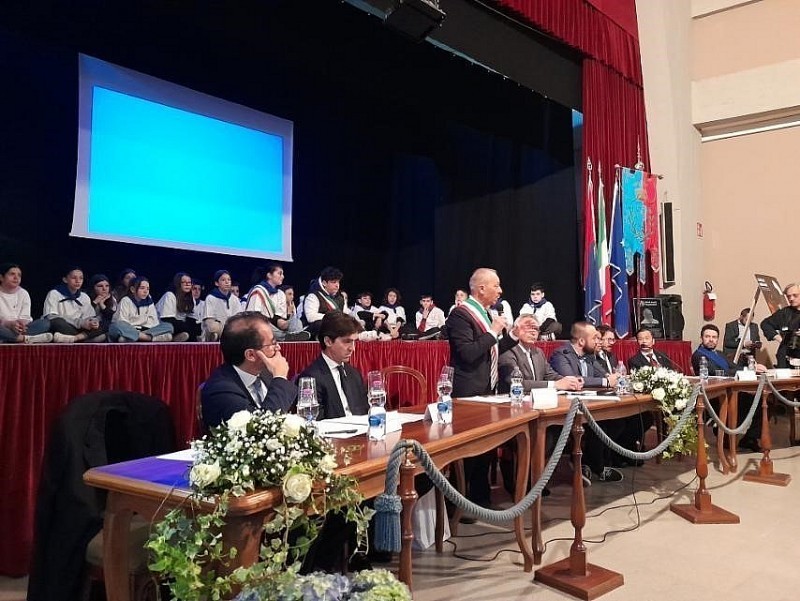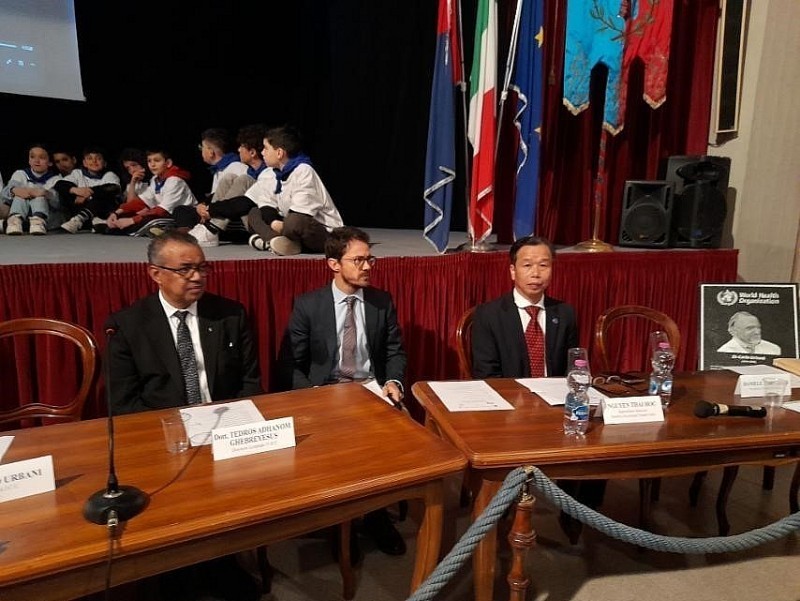The opening ceremony of the project was attended by several esteemed guests, including Director-General of the World Health Organization (WHO) Tedros Adhanom Ghebreyesus, Italian Deputy Health Minister Marcello Gemmato, President of the Marche region Francesco Acquaroli, President of the Legislative Assembly of the Marche region Dino Latini, President of Ancona Province Daniele Carnevali, Mayor of Castelplanio city Fabio Badiali, President of the Carlo Urbani Italy Association Tommaso Urbani, representatives of the Embassy of Vietnam to Italy, as well as medical experts, various officials, and Italian and international friends.
 |
| The mayor of Castelplanio city speaks at the opening of the museum. (Photo: TGVN) |
Speaking at the opening ceremony, WHO Director-General Ghebreyesus called Dr Carlo Urbani “a hero,” a symbol of the global fight against disease. His wisdom and experience in preventive medicine and vaccination, as well as his treatment of less developed countries, remain relevant even today. Ghebreyesus presented the museum with a commemorative plaque honoring the outstanding citizen of the city of Castelplanio, which used to be displayed at WHO headquarters in Geneva.
On behalf of the Vietnamese Embassy to Italy, Counselor Nguyen Thai Hoc emphasized the importance of this event in honoring Dr. Carlo Urbani’s great contributions and dedication to world health, as well as his commitment to protecting health and saving lives.
Dr. Carlo Urbani was a renowned WHO expert on infectious diseases in Vietnam. His dedication to researching the SARS epidemic in 2003 helped Vietnam identify and analyze the virus causing the disease. Through isolation and intensive care, he was able to effectively contain SARS in a short amount of time. This courageous act serves as a testament to the strong bond between Italy and Vietnam. His life is a shining example of mutual understanding and cooperation.
 |
| WHO Director General and representative of the Vietnamese Embassy in Italy at the opening ceremony. (Photo: TGVN) |
Twenty years after his death, a museum dedicated to Carlo Urbani has been opened in his memory. Divided into three main areas, the museum celebrates the life, passions, and activities of this renowned doctor and scientist. It also pays homage to his professional and human legacies, showcasing memorabilia and memories of the doctor who sacrificed his own life to save others.
Dr. Carlo Urbani, who had worked in Vietnam for many years, made a huge contribution to the identification of the new SARS pandemic in 2003. Unfortunately, while on his way to Thailand, he fell ill and passed away on March 29, 2003, at the age of 46. Even in death, Dr. Urbani remained committed to stopping the pandemic. He asked doctors to use his lung as a study specimen. As a result of his selflessness, two weeks after his death, scientists were able to detect the corona virus and develop methods for controlling the SARS pandemic.
WHO honored the late Dr. Carlo Urbani — a hero in the battle against the SARS pandemic — with these beautiful words: “Despite his early death, Dr. Carlo Urbani lived a full life. If he were still alive, he would still be an exemplary representative of WHO’s mission — to protect health, keep the world safe, and serve the vulnerable.”
In 2022, the late doctor was awarded the Order of Merit by the Italian government in recognition of his outstanding contributions to the detection, identification, and swift response to new diseases, thus safeguarding human health.
Vietnam’s First Ao dai Museum
A museum dedicated to showcasing only Ao dai (a traditional Vietnamese dress) through various periods and the process of making them has opened in Ho Chi Minh City’s District 9.








